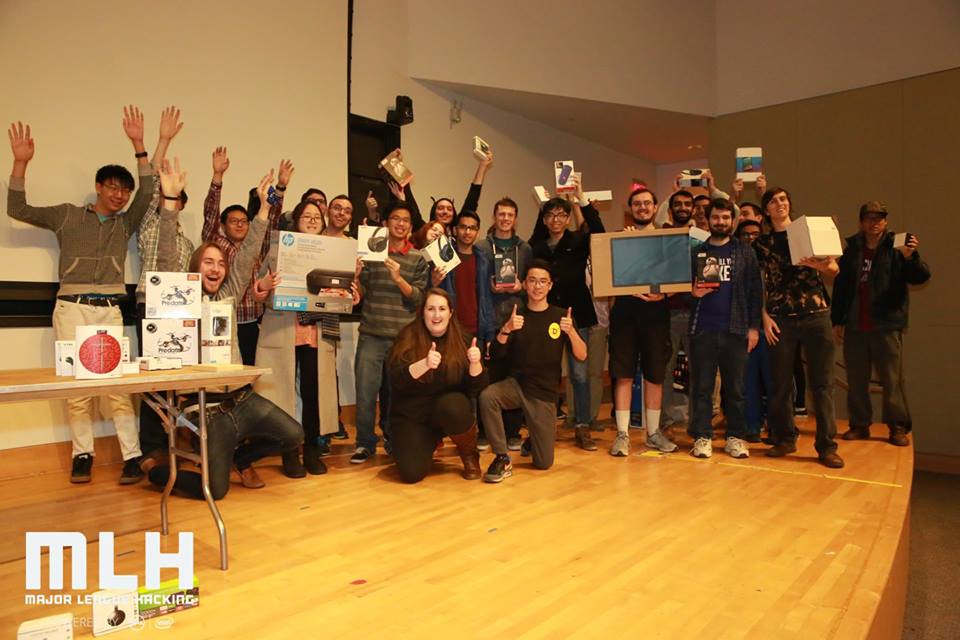Posed like a stage magician, James Gissendaner beckons his fellow Dragon Hacks participants to test his newest innovation, Mirror Mirror.
The touch-free smart mirror, designed to upload personal information based on facial recognition, is a huge hit: revelers wave their hands and weave in and out of view to generate data on emotions, health and work schedules.
“We had a major compiler error overnight, so the facial recognition didn’t quite come together as we’d hoped,” Gissendaner said, laughing. “But it was really fun to bring in a whole mirror and build an interface from the ground up.”
A master’s student from the University of Louisville, Gissendaner is one of more than 500 attendees at Dragon Hacks, a buzzing menagerie of Oculus Rift headsets and Raspberry Pi computers occupying six floors of Drexel’s Bossone Research Enterprise Center in University City. Over 24 hours from Jan. 16-17, teams from as far away as China hacked their way to more than $10,000 in hardware prizes such as a smart TV, Xbox One, iPads and the Nexus P6, attending workshops and tackling challenges from sponsors such as IBM, Microsoft, AmeriGas and KieranTimberlake.
Andreessen Horowitz always says that 'software is eating the world,' but here it's not the same.
Projects ranged from health services, like Rock Hand, an app inspired by the video game Rock Band that combats arthritis by having the user do hand exercises, to creative fusions of software and hardware, like Gissendaner’s Mirror Mirror. For many teams, Dragon Hacks was their first chance to use several state-of-the-art technology components, notably app development platform IBM Bluemix and the Pebble smartwatch.
The powerhouse behind the event, Drexel’s Institute of Electrical and Electronics Engineers (IEEE) student chapter, hopes the emphasis on integrated software and hardware development will distinguish Dragon Hacks from its larger and older neighbor, the University of Pennsylvania’s PennApps.

DragonHacks had a big hardware presence. (Photo courtesy of Major League Hacking)
“[VC firm] Andreessen Horowitz always says that ‘software is eating the world,’” said Jacky Liang, a computer engineering major at Drexel who worked with electrical engineering student Savannah Lee and advisor Dr. Ioannis Savidis to bring Dragon Hacks to life. “But here it’s not the same — there’s lots of hardware projects and I think there’s a lot of potential for engineering students to use their practical knowledge in different ways.”
Dragon Hacks’ culture also brings something new to the University City tech ecosystem, Savannah says.
“At PennApps, there’s so much pressure because it’s so established and has a big name,” she says. “We wanted to create a place where it can be your first time doing a hardware hack and you feel welcome.”
She points to the Pratt Institute’s hackathon design workshop as an example of how creative thinking helps first-timers adjust to an unfamiliar ideation process.

This reporter tries the Oculus Rift. (Courtesy photo)
Participants were treated to some other big-name inspirations as well: both Mike Swift, founder of Major League Hacks, and Emily McManus from TED Talks were in attendance. Project judges included Swift, IBM Cloud Evangelist Remko de Knikker, Linode’s Stormy Mayersky and PRA Health Science’s Mark Neuberger.
Some of the coolest Dragon Hacks challenge winners were:
- T-Translate, a wearable chest device that acts as a universal language-to-text translator.
- GitLive, a Domain.com-enabled service that tracks live statistics on GitHub users
- An unnamed low-cost liquid volume measuring device that featured gas leak detection software for the AmeriGas Tank Monitor Challenge.
Dragon Hacks’ overall winner was Sign Me, a wearable camera that translates American Sign Language into English and then sends a text message to a recipient’s phone.
Check out all the Dragon Hacks 2016 judges and prizes here.
Thinking of working with hardware for your next project? Take a look at Dragon Hacks’ extensive hardware list for some inspiration.
Join the conversation!
Find news, events, jobs and people who share your interests on Technical.ly's open community Slack

Philly daily roundup: Closed hospital into tech hub; Pew State of the City; PHL Open for Business

Philly daily roundup: A better coffee supply chain; Philly Tech Week returns; Apply to Pennovation Accelerator

A biotech hub is rising at Philadelphia’s shuttered Hahnemann Hospital campus

